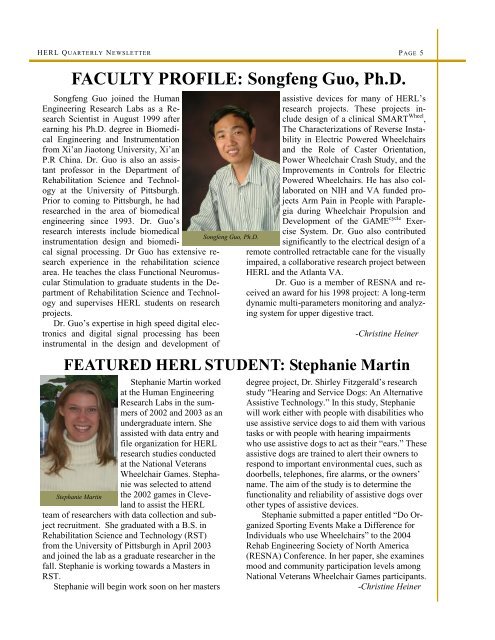FEATURED HERL STUDENT - Human Engineering Research ...
FEATURED HERL STUDENT - Human Engineering Research ...
FEATURED HERL STUDENT - Human Engineering Research ...
You also want an ePaper? Increase the reach of your titles
YUMPU automatically turns print PDFs into web optimized ePapers that Google loves.
<strong>HERL</strong> QUARTERLY NEWSLETTER PAGE 5<br />
FACULTY PROFILE: Songfeng Guo, Ph.D.<br />
Songfeng Guo joined the <strong>Human</strong><br />
<strong>Engineering</strong> <strong>Research</strong> Labs as a <strong>Research</strong><br />
Scientist in August 1999 after<br />
earning his Ph.D. degree in Biomedical<br />
<strong>Engineering</strong> and Instrumentation<br />
from Xi’an Jiaotong University, Xi’an<br />
P.R China. Dr. Guo is also an assistant<br />
professor in the Department of<br />
Rehabilitation Science and Technology<br />
at the University of Pittsburgh.<br />
Prior to coming to Pittsburgh, he had<br />
researched in the area of biomedical<br />
engineering since 1993. Dr. Guo’s<br />
research interests include biomedical<br />
instrumentation design and biomedical<br />
signal processing. Dr Guo has extensive research<br />
experience in the rehabilitation science<br />
area. He teaches the class Functional Neuromuscular<br />
Stimulation to graduate students in the Department<br />
of Rehabilitation Science and Technology<br />
and supervises <strong>HERL</strong> students on research<br />
projects.<br />
Dr. Guo’s expertise in high speed digital electronics<br />
and digital signal processing has been<br />
instrumental in the design and development of<br />
Songfeng Guo, Ph.D.<br />
assistive devices for many of <strong>HERL</strong>’s<br />
research projects. These projects include<br />
design of a clinical SMART Wheel ,<br />
The Characterizations of Reverse Instability<br />
in Electric Powered Wheelchairs<br />
and the Role of Caster Orientation,<br />
Power Wheelchair Crash Study, and the<br />
Improvements in Controls for Electric<br />
Powered Wheelchairs. He has also collaborated<br />
on NIH and VA funded projects<br />
Arm Pain in People with Paraplegia<br />
during Wheelchair Propulsion and<br />
Development of the GAME cycle Exercise<br />
System. Dr. Guo also contributed<br />
significantly to the electrical design of a<br />
remote controlled retractable cane for the visually<br />
impaired, a collaborative research project between<br />
<strong>HERL</strong> and the Atlanta VA.<br />
Dr. Guo is a member of RESNA and received<br />
an award for his 1998 project: A long-term<br />
dynamic multi-parameters monitoring and analyzing<br />
system for upper digestive tract.<br />
-Christine Heiner<br />
<strong>FEATURED</strong> <strong>HERL</strong> <strong>STUDENT</strong>: Stephanie Martin<br />
Stephanie Martin worked<br />
at the <strong>Human</strong> <strong>Engineering</strong><br />
<strong>Research</strong> Labs in the summers<br />
of 2002 and 2003 as an<br />
undergraduate intern. She<br />
assisted with data entry and<br />
file organization for <strong>HERL</strong><br />
research studies conducted<br />
at the National Veterans<br />
Wheelchair Games. Stephanie<br />
was selected to attend<br />
Stephanie Martin<br />
the 2002 games in Cleveland<br />
to assist the <strong>HERL</strong><br />
team of researchers with data collection and subject<br />
recruitment. She graduated with a B.S. in<br />
Rehabilitation Science and Technology (RST)<br />
from the University of Pittsburgh in April 2003<br />
and joined the lab as a graduate researcher in the<br />
fall. Stephanie is working towards a Masters in<br />
RST.<br />
Stephanie will begin work soon on her masters<br />
degree project, Dr. Shirley Fitzgerald’s research<br />
study “Hearing and Service Dogs: An Alternative<br />
Assistive Technology.” In this study, Stephanie<br />
will work either with people with disabilities who<br />
use assistive service dogs to aid them with various<br />
tasks or with people with hearing impairments<br />
who use assistive dogs to act as their “ears.” These<br />
assistive dogs are trained to alert their owners to<br />
respond to important environmental cues, such as<br />
doorbells, telephones, fire alarms, or the owners’<br />
name. The aim of the study is to determine the<br />
functionality and reliability of assistive dogs over<br />
other types of assistive devices.<br />
Stephanie submitted a paper entitled “Do Organized<br />
Sporting Events Make a Difference for<br />
Individuals who use Wheelchairs” to the 2004<br />
Rehab <strong>Engineering</strong> Society of North America<br />
(RESNA) Conference. In her paper, she examines<br />
mood and community participation levels among<br />
National Veterans Wheelchair Games participants.<br />
-Christine Heiner


